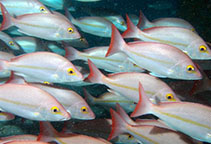| Family: |
Lutjanidae (Snappers), subfamily: Lutjaninae |
| Max. size: |
50 cm TL (male/unsexed); max. reported age: 40 years |
| Environment: |
reef-associated; marine; depth range - 20 m |
| Distribution: |
Western Pacific: restricted to the east coast of Australia and New Caledonia. The main Australian distribution is off southern Queensland between Cape Moreton (about 27°S) and the Capricorn Group(23°S). This species has been usually referred to as Lutjanus amabilis by previous authors. |
| Diagnosis: |
Dorsal spines (total): 10-10; Dorsal soft rays (total): 14-14; Anal spines: 3-3; Anal soft rays: 8-8. Snout somewhat pointed. Preopercular notch and knob moderately well developed. Scale rows on back rising obliquely above lateral line. Generally pale blue-gray to whitish with suffusion of yellow on upper back. A prominent golden brown stripe, slightly narrower than the eye, runs laterally from the rear edge of the of the opercle to the caudal peduncle. |
| Biology: |
Adults mainly inhabit coral reefs. Sometimes forming large aggregations around rocky outcrops during daylight hours. They disperse to feed at night (Ref. 9710). Usually marketed fresh. |
| IUCN Red List Status: |
Least Concern (LC); Date assessed: 04 March 2015 Ref. (130435)
|
| Threat to humans: |
harmless |
Source and more info: www.fishbase.org. For personal, classroom, and other internal use only. Not for publication.

